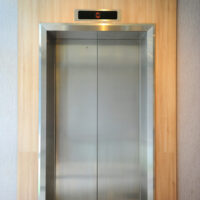New York Elevator Maintenance Company May be Liable for Trip and Fall

A woman who tripped and fell due (allegedly) to a misleveled elevator sued the property owner, the landlord and the elevator company. The property owner and landlord filed motions for summary judgment on the grounds that they didn’t have any notice of a dangerous condition, and the court ruled in their favor on these motions back in 2014. The elevator company didn’t file its motion in a timely manner, and the court declined to modify its judgment to include them in the summary judgment. This remaining defendant, New York Elevator & Electrical Corp. (NYE&E), appealed that decision in the case of Ezzard v. One East River Place Realty company, LLC.
On May 5th of this year, the Appellate Division held that the court should have modified its ruling to grant summary judgment for the elevator company as well. Even though their motion was untimely, it included all the same issues as the other defendants’ motions, so it would have served the administration of justice to hear all the motions together.
Lack of Notice doesn’t stop Res Ipsa Loquitor
That ruling only applies to the notice-based claims, however. Generally, to hold a property owner liable for an unsafe or dangerous condition, you have to prove that the property owner (or landlord, or elevator service company) had actual or constructive knowledge of the dangerous condition – meaning they either knew about it or should have known about it – but failed to correct it in a reasonable time.
But there is another way the defendant could be liable that doesn’t require proving the defendant was on notice: the doctrine of res ipsa loquitor. This is a Latin phrase meaning, “the thing speaks for itself,” and it can be used to say that the defendant must have been negligent; otherwise the accident wouldn’t have happened. In the case of res ipsa loquitor, the plaintiff does not have to prove that the defendant had notice of the condition.
Fortunately, the plaintiff in this case had raised both negligence and res ipsa loquitor claims, so even though the court dismissed the ordinary negligence claim because the plaintiff didn’t show notice of the defective condition, the court held alive the res ipsa loquitor claim.
New York courts have applied res ipsa loquitor to elevator malfunctions many times, and the appeals court here agreed that the plaintiff had raised enough facts for a res ipsa loquitor claim to be heard against NYE&E:
- elevator misleveling does not occur without negligence;
- by virtue of its maintenance contract, NYE&E had exclusive control over the elevator;
- the plaintiff didn’t do anything to contribute to the unsafe condition.
This is enough to get the case to a jury and allow them to infer negligence on the part of NYE&E. They could also consider any comparative negligence on the plaintiff’s part. Maybe the elevator was misleveled, and maybe the plaintiff just mis-stepped. This is a question for the jury to decide; the plaintiff’s personal injury case against the elevator maintenance company will move forward.


